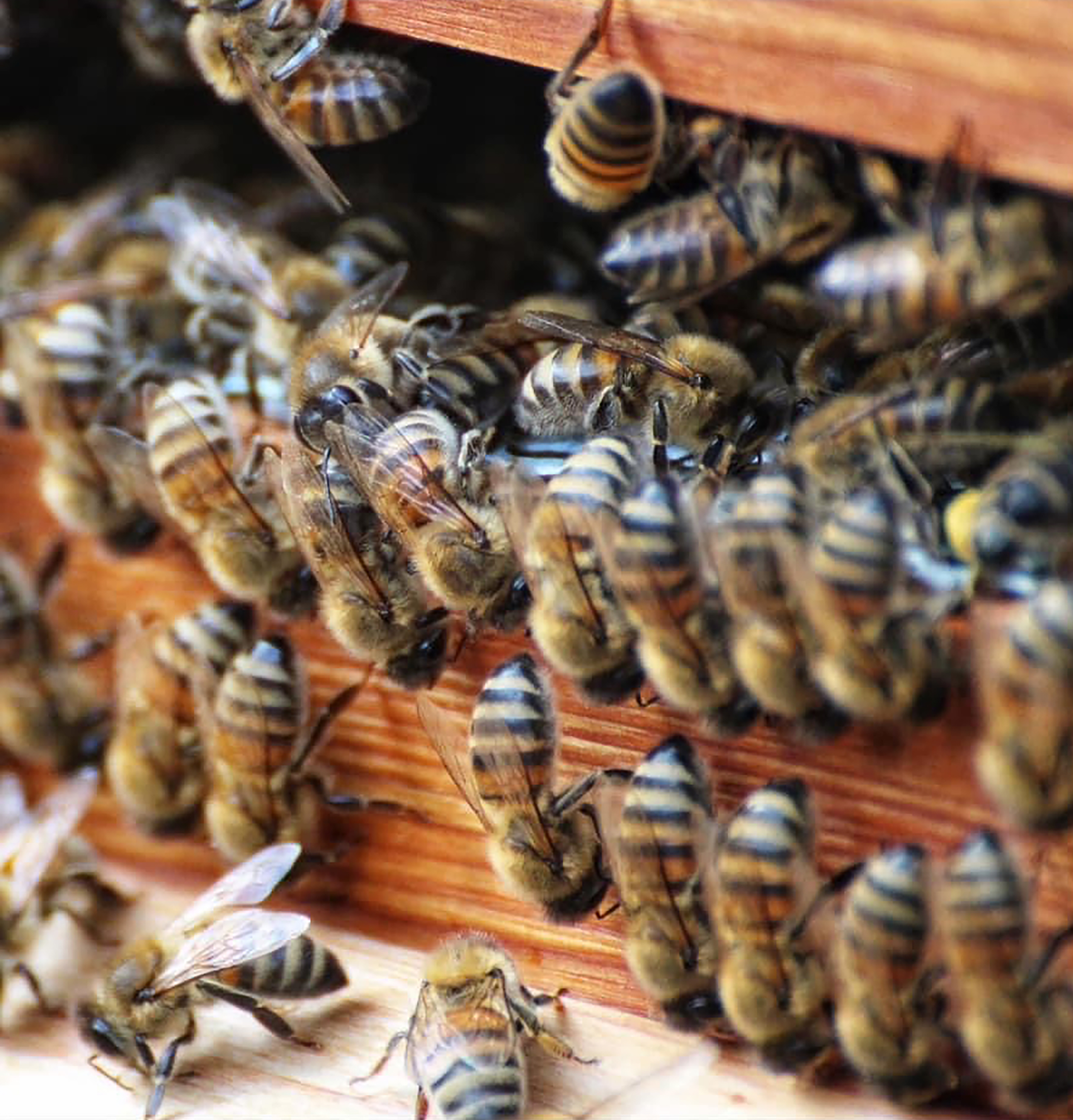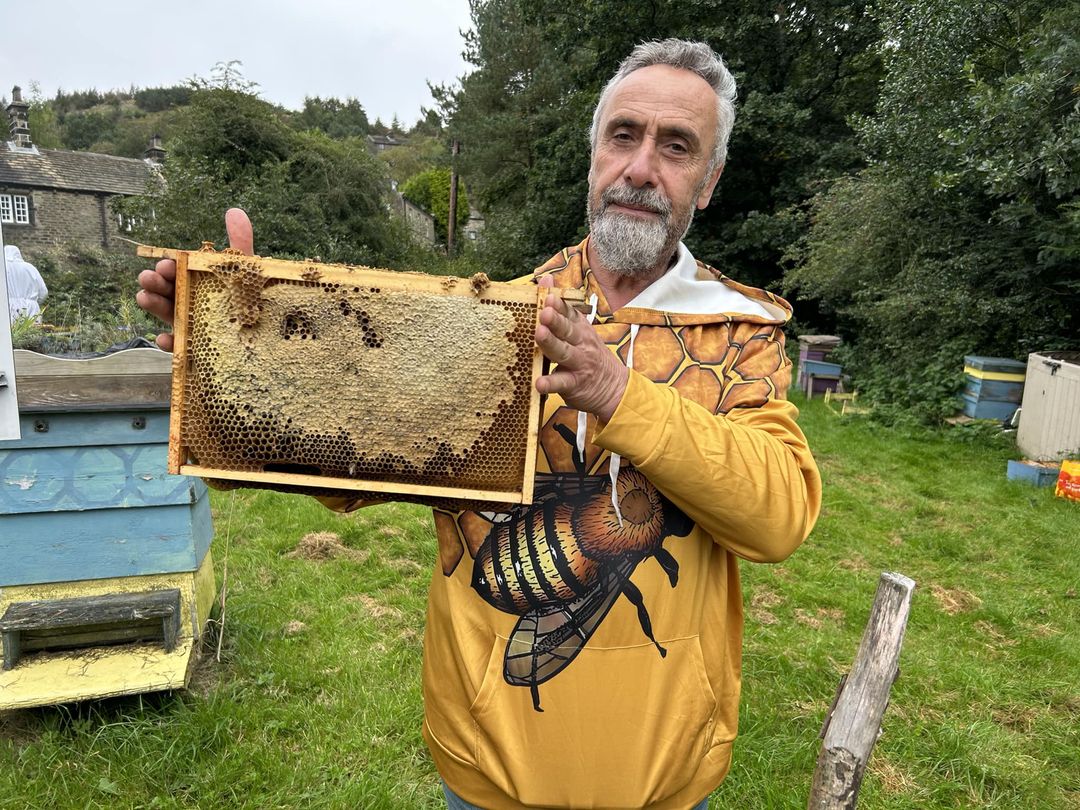Sue Whigham finds out about The Buzz Project, an inspirational initiative set up by Syrian bee expert Dr. Ryad Alsous
One of the last things that Dr. Ryad Alsous did before he left his flat in Damascus was to open one of his windows a fraction. As the civil war raged, his block of flats had been bombed twice during what were daily attacks in the eastern part of the city. Realising that there would be no-one to feed the doves who had shared his balcony for years, he decided that they should be able to use his flat as he had no further use for it. Five years later he asked his cousin to visit the flat and take a picture for him. He found it was full of life as the doves had moved in and had happily colonised the place. Dr. Alsous felt it gave him validation to have left to start a new life in a safe country.
Despite receiving death threats, Dr. Alsous was the last of his immediate family to leave Syria and in 2013 he found himself in Huddersfield where he had relatives who had settled there over the past forty years. He found it somewhere where the community both helped him to settle in and to rebuild his life.
He is a world renowned expert on bees and his experience both lecturing at Damascus University and being Head of Beekeeping – when he was in charge of 500 hives – stood him in good stead when he arrived in the UK. He began volunteering at the Huddersfield Beekeeping Association and through them a lady offered him both a hive and a colony of British Black Bees. He then wrote a proposal for The Buzz Project and met with the then Mayor of Huddersfield. It was through this meeting that he was offered a piece of land to keep hives on by the local Canal and River Trust – who then refused to accept any rent from him. And so The Buzz Project was launched.
The idea of the project was, and is, to offer fellow refugees and job seekers the chance to integrate, develop language skills, and to regain their self esteem and confidence whilst learning a trade. Many of the volunteers are now self employed and have their own hives from which they produce honey, essential oils, candles and organic cosmetics. The project also has open days when the volunteers educate schoolchildren about bees and how vital they are in the general scheme of things.
I was reading a report produced by Friends of the Earth which tells us that it would cost UK farmers £1.8 billion a year to pollinate crops without them (if indeed that were remotely feasible). So no bees equals no plants, no animals and subsequently, no food.
Dr. Alsous was one of the inspirations for the bestselling novel by Christy Lefteri, The Beekeeper of Aleppo. As the daughter of refugees herself, she had spent several months in Athens volunteering with Syrian refugees where the seeds of her novel began to form. Having discovered an article written by Dr. Alsous, she contacted him through Facebook and he invited her up to Huddersfield to see how The Buzz Project worked and to “introduce her to the world of beekeeping”. She trusted him enough to meet his bees without wearing protective clothing, as he so obviously had such an affinity with them and she remembers the experience as “like being in a dangerous but beautiful bubble”.
The Dark European Bee, or British Black Bee, Apis mellifera mellifera, was the original native bee in the UK and by the 1920s was virtually extinct. Dr. Alsous is very much involved in promoting these bees over imported bees (usually from Italy). He is joined in this by Sir Tim Smit, inspirational co-founder of both The Eden Project and The Lost Gardens of Heligan, who suggests that we need a network of apiarists to champion these bees. As he says, “we super love these bees”.
At the Eden Project they are working with B4 to set up a conservation and research project to champion the British Black Bee and to recognise the need to create reserves and help the bees develop ‘strongholds’ throughout the country. Sir Tim has been instrumental in both promoting the British Black Bee and setting up a fourth reserve. He confirms that there is a lot of interest amongst members of the public to both gardens and that Cornwall is one of the counties where these bees are thriving.
It seems that most beekeepers (approximately 80%) keep the less hardy European bees which have a shorter life span but do have the advantage of producing large broods. However, it seems that the European strains ‘stay in and sulk’ at the first sign of bad weather. Both men champion the British Black Bee for a variety of reasons, which include the fact that they are hardy and can cope with the vagaries of British weather and – as they are hairy – are less prone to any form of mite. They also groom each other which helps in keeping disease away. Dr. Alsous has been carrying out research comparing the British Black Bee with four other strains, including Syrian bees, and has found that our native bees came out top in their production of honey.
Finally, the HS2 project has been, and still is very controversial since its inception and has of course constantly been in the media. But for some, hopefully, good news. I read that HS2 has, it seems, partnered with the Great British Bee Project to plant up millions of native trees and shrubs along the ‘green corridor’ of the Phase One rail line of HS2 which will encourage the Black British Bee to once again flourish. They are to be monitored over the next few years too.
I know that Dr. Alsous mentions limes and hawthorn as favourites of the British Black Bee. Perhaps any of us who has room for a new tree this winter might bear this in mind and perhaps plant one or other – or both.
Sue Whigham can be contacted on 07810 457948 for gardening advice.

You may also like
In the Night Garden
Jo Arnell explains how to make the most of your outdoor space once darkness falls Some enchanted evening you may see me outside – mainly searching for slugs in the garden, because the cool hours of night are when they...
Contain your excitement
Jen Stuart-Smith discusses how to get creative with your pots and planters My love affair with plants started with houseplants when I was a child. As my bedroom windowsill overflowed – resulting, occasionally, in waking up with compost under my...
More than just a pretty face
Jen Stuart-Smith explores the multiple uses of some easy-to-grow garden favourites When you grow flowers for their beauty, shape and colour it can be easy to forget all the other qualities they have to offer. Some are edible, others provide...










